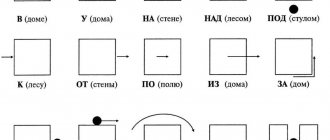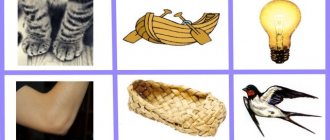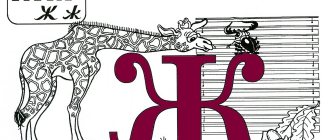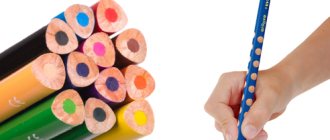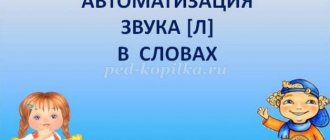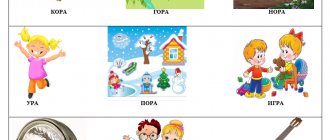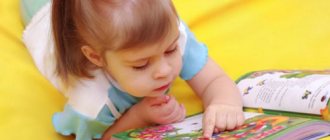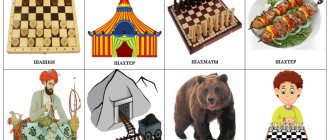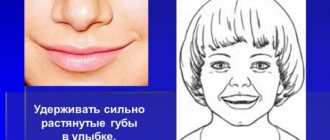Automation of the sound “L” in pure tongues using mnemonic tracks is carried out after automation in syllables, words and phrases. Classes on automation in sentences can be carried out both before and after phrases.
At the initial stages, when pronouncing the sound L, you need to bite the tip of your tongue. Later, when the sound is pronounced easily, we move the tongue behind the upper teeth.
Helpful Tips:
- At the beginning of each lesson on automating the sound “L” we conduct 2-3 articulatory gymnastics exercises.
- During the lesson, ensure the correct articulation of the sound “L” (see articulatory gymnastics).
- Classes are held regularly for 20-25 minutes depending on the age of the child and alternating play exercises.
- At the first signs of fatigue, take a physical minute. Kinesiological exercises are very useful for relieving tension and emotional relaxation.
- Classes should be conducted in a friendly and comfortable environment for the child.
- If the child has already mastered the correct pronunciation of the sound “L”, then the lessons can be made active. Walk, climb, jump, repeating rhythmic phrases. Learn them and use them. like counting rhymes, songs, etc.
Automation of the sound “L” in pure phrases, as in sentences, develops associative thinking. The child needs to match each word with the picture and name it.
Mnemonic tracks of pure tongues will also introduce children to prepositions and will be able to visually designate this “invisible” word using model diagrams.
Preposition models:
Pure sayings for the sound “h”
The sound "Ch" belongs to the hissing group. It is staged after correcting the pronunciation of “sh” and “zh”. There are not many words with the sound “ch”, so the pure words are divided by syllables.
| Straight syllables | Reverse syllables | Other syllables |
CHA:
| AC:
| ACCA:
|
| OC-OC-OC - Night has fallen. | POINTS:
|
CHU:
| UC:
| UCHA:
|
CHI:
| ICH:
| ICHKA:
|
Pure phrases on the sound “ch” help to consolidate the correct articulation of sibilants. Children should clearly pronounce all sounds, which has a positive effect on diction. For a 5-year-old child, material with complex words corresponding to the level of his vocabulary is suitable.
Pure sayings for the sound “k”
Pure sayings for children can be used not only by speech therapists, but also by parents. Usually by the age of 5 the sound “k” is formed. But it happens that disorders of the posterior lingual group persist into older preschool age.
About winter:
- KI-KI-KI - let's play snowballs;
- KI-KI-KI - I have skates;
- OK-OK-OK - let's go to the skating rink;
- OK-OK-OK – it’s snowing outside;
- IR-IR-IR - there is a snowman in the yard.
About spring:
- KA-KA-KA - a river runs in the spring;
- KA-KA-KA - clouds float across the sky;
- KO-KO-KO – in spring the sun is high.
About vegetables and fruits:
- UK-UK-UK - mom cuts onions;
- OK-OK-OK – we collect garlic;
- OK-OK-OK – we have grown a zucchini;
- OVKA-OVKA-OVKA – delicious carrots.
About clothes:
- KI-KI-KI - bought socks for the boy;
- APKA-APKA-APKA – knitted hat;
- OK-OK-OK – together we are looking for the sock;
- OLKA-OLKA-OLKA – bright T-shirt.
About transport:
- IR-IR-IR - a truck passed;
- KO-KO-KO - planes high.
Pure phrases for the sound “k” help to consolidate the correct basic articulation of the posterior lingual group.
Pure sayings for the sound “z”
Pure sayings for 5-year-old children on the sound “z” help to consolidate the basic articulation of whistling sounds. There are not many of them, because in reverse syllables the voiced phoneme is deafened. Therefore, they select material for practicing sound images in straight syllables or between vowels.
Pure sayings will be more beneficial for children if you turn learning into a game
About spring:
- ZY-ZY-ZY – birch leaves appeared;
- FOR-ZA-ZA - here comes the May thunderstorm.
About winter:
- ZY-ZY-ZY – severe frosts in winter;
- ZY-ZY-ZY – the snow shines like diamonds;
- RAM-RAM-RAM – we write letters to Santa Claus.
About pets:
- FOR-ZA-ZA – the goat went for a walk;
- ZU-ZU-ZU – we found a goat;
- ZY-ZY-ZY – a beautiful bow on a goat.
About transport:
- ZY-ZY-ZY – the car carries loads;
- FOR-ZA-ZA – I’ll hit the brakes.
About insects:
- FOR-ZA-ZA - a dragonfly flies towards us;
- ZU-ZU-ZU – we caught a dragonfly.
In classes, speech therapists use both pure sayings and short poems at the same time so that the process of automating “z” goes faster. Words should be selected so that the voiced sound is in a strong position, otherwise the child will confuse it with other whistling sounds.
Pure sayings for the sound “zh”
Pure pronouncements for 5-year-old children on the sound “zh” help automate the correct pronunciation of one of the basic sounds of the hissing group.
About autumn:
- ZHI-ZHI-ZHI - collected ears of rye;
- ZHI-ZHI-ZHI - hedgehogs are getting ready to sleep;
- ZHAI-ZHAI-ZHAI - the autumn harvest has ripened.
About wild animals:
- ZHA-ZHA-ZHA - we met a hedgehog in the forest;
- ZHU-ZHU-ZHU - we will give berries to the hedgehog;
- ZHI-ZHI-ZHI - hedgehogs live in the forest.
There are not many pure phrases for the sound “zh”, due to the deafening of the voiced phoneme in reverse syllables.
Most often, children do not have difficulty automating this sound, because the correct basic articulation of hissing sounds has already been formed. The main thing is that the adult pronounces the voiced phoneme loudly so that the child does not confuse it with another sound.
Useful tips
- At the beginning of each lesson on automating the sound “L” we conduct 2-3 articulatory gymnastics exercises.
- During the lesson, ensure the correct articulation of the sound “L” (see articulatory gymnastics).
- Classes are held regularly for 20-25 minutes depending on the age of the child and alternating play exercises.
- At the first signs of fatigue, take a physical minute. Kinesiological exercises are very useful for relieving tension and emotional relaxation.
- Classes should be conducted in a friendly and comfortable environment for the child.
- If the child has already mastered the correct pronunciation of the sound “L”, then the lessons can be made active. Walk, climb, jump, repeating rhythmic phrases. Learn them and use them. like counting rhymes, songs, etc.
Automation of the sound “L” in pure phrases, as in sentences, develops associative thinking. The child needs to match each word with the picture and name it.
Mnemonic tracks of pure tongues will also introduce children to prepositions and will be able to visually designate this “invisible” word using model diagrams.
Pure sayings for the sound “s”
Pure sayings for children 5 years old are used at the initial stages of automation. Children of primary preschool age can easily learn them. The sound “s” is one of the basic phonemes, so it is corrected starting from 2-3 years.
| Syllables | Pure talk |
| SA |
|
| SU |
|
| SY | There is a wasp's house. |
| SI | The plane has landing gear. |
| AC | Squirrel stocked up. |
| EU | How beautiful the autumn forest is. |
| OS |
|
| US | The bus stopped here. |
| WASPES | The apricots are ripe. |
| SYATA | The piglets came running. |
| DREAM | We will assemble the squash. |
Pure speeches are combined with other exercises to automate sound. They are a transitional stage from syllables to words. The material proposed above for speech therapy classes will help to consolidate the correct articulation of the whistling group.
Pure sayings starting with the sound “r”
Pure sayings with the sound “r” are not suitable for children of primary preschool age, because sonors appear in children’s speech starting from the age of 5. Until this time, the articulatory apparatus is not ready to pronounce them.
| Syllables | Pure talk |
| RA |
|
| RO |
|
| RU |
|
| RY |
|
| RI | The bullfinches have arrived. |
| AR |
|
| OR |
|
| UR | We'll go feed the chickens. |
| GENUS | We are digging a garden. |
| ORY |
|
In pure phrasing with the sound “r”, you should try not to use words with the sound “l”. During speech therapy classes, material is selected taking into account the sound being practiced. If the phoneme in direct syllables is automated, then pure phrasing should contain this type of syllables.
Pure sayings for the sound “t”
The sound "t" appears in children's speech at an early age. And if there are distortions in his pronunciation, correction is carried out at 3 years.
Pure sayings for practicing “t” in straight syllables:
- TA-TA-TA - We are bringing a cat;
- TA-TA-TA - Our house is clean;
- TO-TO-TO – Beautiful coat;
- TO-TO-TO - We played lotto;
- TU-TU-TU - Let's give milk to the cat;
- TU-TU-TU - We played rounders;
- YOU-YOU-YOU - The cats meowed;
- YOU-YOU-YOU – Katya has white bows;
- YOU-YOU-YOU – We are watering the flowers.
Pure sayings for automating “t” in reverse syllables:
- AT-AT-AT - They bought me a scooter;
- AT-AT-AT - The children went for a walk;
- OT-OT-OT – The gray cat meowed;
- OT-OT-OT - A plane flew by;
- YUT-YUT-YUT – We create comfort;
- IT-IT-IT – In the spring the bird will fly;
- IT-IT-IT – The porridge is boiling on the stove;
- IT-IT-IT – Our cat is thirsty.
The proposed pure phrases will help to consolidate the correct pronunciation of the sound “t” in syllables and words. After automation, it will be easy to fix “d” and repeat pure phrases with this sound.
Pure sayings for the sound “sh”
Pure sayings for children 5 years old are one of the effective exercises for reinforcing correct pronunciation and improving diction. The sound "sh" appears at an early age. Therefore, pure sayings with this phoneme can be selected for children of primary preschool age.
| Syllables | Pure talk |
| SHA |
|
| SHO | We feel very good in winter. |
| SHU |
|
| SHI |
|
| AS | My brother bought me a pencil. |
| OSH | A frosty day is good. |
| USH | We bought a lot of pears. |
| OSHKA |
|
| USHKO | I'll stroke the cat's ear. |
| ISHNYA | The cherries are ripe in the garden. |
| OSHKU | We dig potatoes in the fall. |
| TIRE | The car arrived. |
If there are no pure sayings with automated sounds, they can be replaced with short poems. This option allows you to include more words with a practiced phoneme in the lesson.

